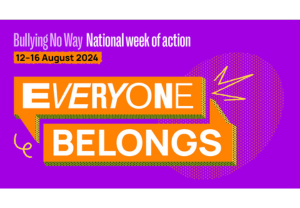Breaking bias through Bullying No Way Week
- Home
- Latest news
- We hear you
- Breaking bias through Bullying No Way Week

The National Day of Action against Bullying and Violence has a new name, 'Bullying No Way: National week of action' and will occur between 12 to 16 August 2024 with the theme 'Everyone belongs'. The initiative suggests that by embracing and respecting everyone’s differences, bullying will struggle to find a place. The theme also emphasises that everyone has a role in preventing bullying by speaking up and creating a safe place in which people feel supported and respected. This includes ensuring all voices are heard and valued.
There are three types of bullying behaviour: verbal, physical and social. Social bullying includes consistently excluding a person or sharing confidential information. These behaviours can occur in person or online, and research shows that children who experience cyberbullying are often also bullied in person.
Steps to examine programs and approaches in schools (STEPS) is a Bullying No Way framework that helps educators, teachers and staff optimise their anti-bullying programs and approaches. It involves a robust, transparent and comprehensive process that education and care services can use to select an evidence-based approach for its unique service context. Resources include:
Challenging bias in practice
A recently awarded Excellent rated service, Belrose Community & Children’s Centre, took proactive steps in addressing bias and discrimination among peers in response to feedback from concerned families. Recognising the need to challenge their thinking and support social justice for all children and families, the service introduced an anti-bias approach that supported the understanding and challenge of bias.
One of the four goals decided upon for the service's anti-bias approach included, ‘Each child and educator will demonstrate empowerment and the skills to act, with others or alone, against prejudice and/or discriminatory actions'. To achieve this goal, the service eliminated gendered pronouns from the program to liberate children from traditional gender stereotypes, expand their emotional understanding, and support children’s free expression of all emotions.
An improved outcome from the program included children demonstrating awareness of existing stereotypes, such as gender-based social expectations. A noteworthy observation was children engaged in a thoughtful discussion about gender stereotypes relating to ballet dancing. Through a robust debate, the children concluded that boys could indeed be ballet dancers, demonstrating a change of bias.
Additionally, educators critically reflected on the children’s discussions by identifying their own bias regarding gendered language and pronoun usage in everyday interactions. This prompted a shift towards the use of more inclusive language that allowed all children to feel comfortable and included.
What can services do to challenge bias?
We all have biases that may be associated with our social conditioning from prior experiences, societal expectations and social ‘norms.’ These expected behaviours shape our beliefs and actions. They are often influenced by those around us and our exposure to various media sources. It is, therefore, important for educators to consider how their personal bias or other influential biases might impact the young developing minds of the children they work with.
The approved learning frameworks state that ‘Educators engage in critical reflection, challenge practices that contribute to inequities or discrimination and make curriculum decisions that promote genuine participation and inclusion.’ The following reflective questions can help services (including its staff, families and children) to challenge unjust bias and discrimination while promoting inclusive environments for all children.
For educators:
- How can we challenge stereotypes and societal norms with children?
- How have personal biases influenced our education and care of children?
- Are there aspects of our curriculum that may unintentionally reinforce stereotypes or biases?
- How can we modify or expand our curriculum to promote diversity and challenge social conditioning?
For families:
- What does discrimination mean to you?
- Think about your personal biases. How do you think they developed? Are they equitable and just?
- Do you think your personal biases influence your children? What might the implications of this be?
For children:
- What does fair mean?
- Can you think of a time when you saw something that wasn’t fair? Tell me about it.
- What does being 'different’ mean?
- Why do you include people in things? How can we do this at (Service)?